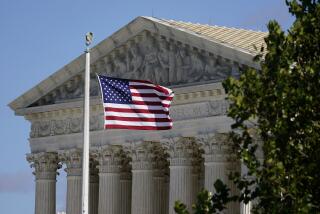High court hears case of lost 401(k) money
- Share via
WASHINGTON — Although U.S. workers can invest money in a retirement fund sponsored by their employer, it is not clear whether they can sue to recover money lost because of mistakes by the fund’s administrator.
That issue came before the Supreme Court on Monday in a case that could shape the pension rights of 70 million employees.
The case began when James LaRue, a management consultant from Texas, said he lost $150,000 from his 401(k) retirement account when the plan’s administrators ignored his instructions to move his money from a high-risk stock fund into government bonds in 2001. LaRue sued his employer, DeWolff, Boberg & Associates, but his claim was thrown out before a trial because, according to the lower courts, the federal law governing pensions and benefits does not allow individuals to sue over losses in their retirement accounts.
His case prompted the high court to reexamine the federal pension law in an era when employees -- not their employers -- are responsible for deciding where their retirement funds will be invested.
In 1974, Congress adopted federal rules for employer-sponsored pension funds and health benefits in the Employee Retirement Income Security Act. In the decades since, the high court has interpreted this worker-protection law to bar employees from suing their employers over benefit claims. For example, the court said employees and their families could not sue for damages if their healthcare plan refused to pay for a needed medical treatment.
During Monday’s oral argument, the justices seemed divided over whether to allow employees like LaRue to sue over losses in their retirement funds.
Under the 1974 law, the sponsors for a pension plan who breach its trust can be sued and forced to pay for “any losses to the plan.” But the lawyer for LaRue’s employer said that did not refer to individual claims. It refers to “something systemic, something that affects the interests of the plan as a whole rather than just one individual participant,” said Thomas Gies.
He and other business lawyers warned that opening the door to lawsuits over investment losses could prove very costly to employers -- and could even encourage some of them to drop their retirement plans.
Bush administration lawyers joined the case on the side of LaRue. They said the 1974 law was intended to protect the pensions of workers. “It is thus hard to imagine that Congress would have left participants and beneficiaries who have been injured by a breach of [trust] duties without any effective federal remedy,” said U.S. Solicitor General Paul Clement in his brief to the court.
A huge sum of money is potentially at issue, Clement noted. In the first quarter of this year, so-called defined contribution plans, to which employees contribute their own money, held about $3.3 trillion in assets, according to the Federal Reserve Board.
Representing LaRue was Peter K. Stris, a law professor at Whittier Law School in Costa Mesa. He said the “plain text” of the 1974 law allows suits when trustees breach their duty, and that is what occurred in this case. This is “a make-whole remedy for . . . losses that are caused by a breach of trust,” he said, not an open-ended claim for damages against the employer.
While Chief Justice John G. Roberts Jr. and Justice Antonin Scalia seemed skeptical of LaRue’s right to sue, Justices David H. Souter, Ruth Bader Ginsburg and Stephen G. Breyer appeared equally skeptical of his employer’s claim that no lawsuits are allowed.
And Justice Anthony M. Kennedy, who usually casts the deciding vote when the court is closely split, was uncharacteristically quiet during the hourlong argument.
It will be several months before a decision will be handed down in the case of LaRue vs. DeWolff, Boberg & Associates.
More to Read
Inside the business of entertainment
The Wide Shot brings you news, analysis and insights on everything from streaming wars to production — and what it all means for the future.
You may occasionally receive promotional content from the Los Angeles Times.











